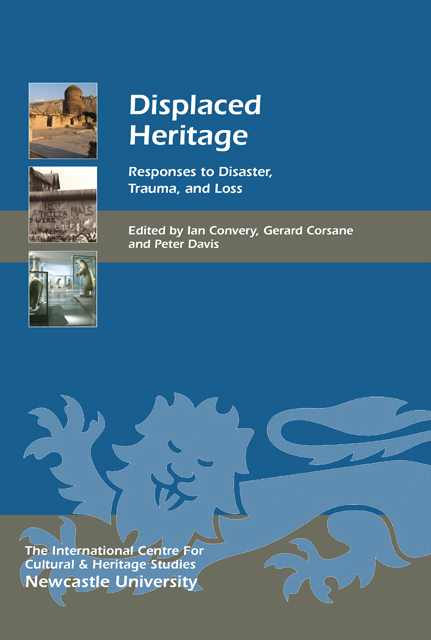Book contents
- Frontmatter
- Contents
- List of Illustrations
- Acknowledgments
- List of Abbreviations
- Preface
- Introduction
- Displaced Heritage: Histories and Tourism
- Displaced Heritage: Trauma, Confinement and Loss
- Displaced Heritage: Lived Realities, Local Experiences
- Displaced Natural Heritage
- Endpiece
- List of Contributors
- Index
- Heritage Matters
Preface
Published online by Cambridge University Press: 24 February 2023
- Frontmatter
- Contents
- List of Illustrations
- Acknowledgments
- List of Abbreviations
- Preface
- Introduction
- Displaced Heritage: Histories and Tourism
- Displaced Heritage: Trauma, Confinement and Loss
- Displaced Heritage: Lived Realities, Local Experiences
- Displaced Natural Heritage
- Endpiece
- List of Contributors
- Index
- Heritage Matters
Summary
I have been asked to provide a brief foreword to this collection of chapters: not to introduce the contents of what is to follow but to offer ‘a personal reflective account of working with disasters that can help position their place in human experience’. I was offered this honour because I happen to have spent the past 40 years visiting scenes of disaster and writing about them. At the risk of appearing to open with a mindless personal travelogue, then, l propose to provide a brief sampling of those places – in rough chronological order – as I have on other occasions.
A coal mining valley in West Virginia known as Buffalo Creek, where a winter flood, caused by a faulty impoundment, caused a terrifying amount of damage to the people living downstream.
An Ojibwa Indian Reserve in Northwest Ontario, Canada, where a mercury spill that had taken place many miles upstream entered the waterways along which the natives had lived, and from which they had drawn sustenance, since the beginning of their reckoning of time. They viewed those waters as a living thing and called the alien substance that had insinuated its way into them ‘pijibowin’, Ojibwa for poison. This shook not only the native economy profoundly but also the native way of life, leaving them with what their wise young chief called ‘a broken culture’.
A nuclear power plant in Pennsylvania called Three Mile Island, where a near meltdown resulted in unexpected levels of dread on the part of people who lived in its shadow. By the standards of the time, that reaction appeared puzzling and even ‘irrational’, but it became apparent before long that it was the standards, not the human reaction, that failed the test of reason.
A migrant farm worker camp in South Florida, where a large group of numbingly poor migrants from Haiti discovered that the money they had earned working the fields – money their families back home had counted on for everyday survival – had simply been stolen.
Native villages along the coasts of Alaska where the seas from which people had extracted their living for centuries had been blackened and polluted for a thousand miles by a gigantic oil spill.
- Type
- Chapter
- Information
- Displaced HeritageResponses to Disaster, Trauma, and Loss, pp. xvii - xxPublisher: Boydell & BrewerPrint publication year: 2014



